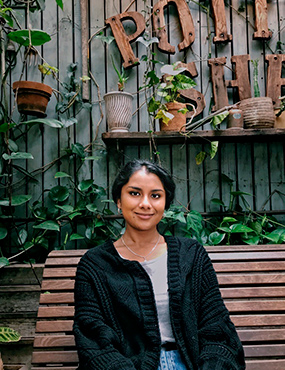Anushiya's tips on how to secure an internship
24 March 2022
Hi, my name is Anushiya and I’m a Bachelor of Laws and Bachelor of Arts (Psychology) student. Last week I talked about the benefits of internships, but today I am giving you some tips on how I got my internship.

CV and cover letter
To ensure that your CV and cover letter are tailored to the organisation you are applying for, make sure you thoroughly research the organisation and the relevant business unit/areas.
The MQ Employability Connect portal provides extremely useful tips on what to include (and not to include) in your CV and cover letter and how to format them. There are so many resources in that portal.
Psychometric testing
Having a computer assess your capabilities can sound daunting and may even appear trivial. There’s really no way you can prepare for psychometric testing because most companies use highly tailored testing that is specific to their company. My advice is to read the instructions carefully before you begin, make the most of any trial runs you get, and make sure you don’t overthink it!
Individual interview/s
STAR technique
It goes without saying that you should answer all interview questions using the STAR technique. Visit the interview preparation page to learn more about how you can leverage it. Giving your answers a structure will not only give you confidence but will also help you provide your answer in an engaging, story-telling manner.
Be yourself
I know it sounds cliché, but just be yourself and let your personality shine. Don’t try to be a people pleaser and say what you think your interviewer wants to hear. Interviewers can see through sugar-coating and over exaggerations and won’t want to work with someone who turns out to have a completely different attitude or demeanour in a work environment.
Ask questions
Asking questions not only demonstrates that you are interested in the company but will also help you learn whether the company you are applying for will be the right fit for you. Try not to ask questions that you can easily Google as this will make you sound unprepared. Rather, ask questions that will help you learn more about the company’s culture, training opportunities, clients, and your interviewer/s professional journeys.
Group case study
Group case studies can be nerve-wracking. It can be difficult finding a good balance between speaking up enough to ensure that you are heard and ensuring that you allow others to speak up too. Remember, the aim of the group case study is to demonstrate that you can be a team player and that you are a confident communicator.
Show leadership
If someone in the group is quiet or hasn’t had a chance to speak, call on them to provide their input. Not only does this show that you are willing to hear everyone’s opinions, but it also shows that you are aware of people’s different communication styles. Speak up if you think that the discussion is going off track and volunteer to be the group’s timekeeper to ensure that you have enough time to present your ideas.
Be an active listener and speaker
Show that you take others’ input seriously. The worst thing you can do is to repeat something that has already been said but another group member as this shows you were not actively engaging in the discussion.
Don’t be afraid to play the ‘devil’s advocate’
Don’t just agree with everything that your fellow group members are saying. Show that you can think dynamically and critically by presenting an opposing point of view to the idea that someone else has raised.
Don’t gatekeep your ideas until the presentation
During one of my group interviews, a member of the team presented a brand-new idea during the presentation portion of the case study which had not been raised during the discussion. Even though it was a good idea, it came out of left-field and it was obvious they were gatekeeping the idea because it was quite unique and technical. Although you may think that this is a smart move, interviewers will flag this as you not being a team player. In the real world, you can’t hide ideas from your team or from your client until the last minute.
Good luck!